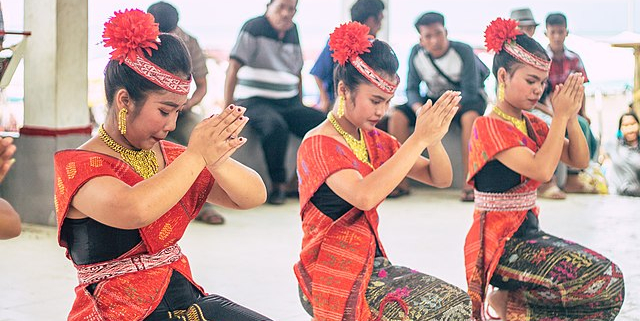Once again, the Indonesian society are faced with a commotion about the claims of traditional culture by the Malaysian society. In this cases that have arisen are related to Tarian Tor-Tor dan Gondang Sambilan (Sembilan Gendang) originating from the Mandailing society of North Sumatra. The interesting thing about this incident is that many parties feel “angry” on what has been done by the Malaysia. From the ordinary people to politicians. Because of this commotion, one question has really raised a question, is there a commitment by the State to guarantee the protection of traditional culture?
Constitutional Guarantee in Protecting Traditional Culture
According to the Preamble to the 1945 Constitution, it is clear that one of the objectives of the establishment of the State of Indonesia is within the framework of protecting the entire Indonesian nation and all of its bloodshed. It means that the State is obliged to be able to provide protection for both human and non-human resources. In the context of non-human resources, the State should be able to protect both natural and non-natural resources, there are no exception in terms of protecting traditional culture.
In accordance with this issue, based on the constitution bodies there are several provisions that provide direction as well as firm guarantees for the protection of traditional culture. The basic of constitutional in the context of protecting traditional culture is stated in Article 18B paragraph (2) of the second amendment to the 1945 Constitution which stated that “The state recognizes and respects customary law community units and their traditional rights as long as they are still alive and in accordance with community development and the principle of the Unitary State of the Republic of Indonesia as regulated in the Law.” and Article 28I paragraph (3) of the second amendment to the 1945 Constitution which reads as follows: Cultural identity and rights of traditional communities are respected in line with the development of times and civilizations”. In addition to the above provisions, Article 32 paragraph (1) and paragraph (2) of the fourth amendment to the 1945 Constitution provide a basis for further strengthening the direction and guarantees of the constitution on the importance of protecting traditional culture in Indonesia.
Loss of Traditional Cultural Protection Guarantee
Based on the currently issue which is developing regarding Malaysia’s efforts with the recording of Tarian Tor-Tor dan Gondang Sambilan (Sembilan Gendang) as cultural heritage, which is really concerning. This concern arises because this case is not the first case but has become a case for the umpteenth time related to traditional culture. The question is, in this context can the State be considered to have lost its commitment to guarantee the protection of traditional culture?
Talking about the state’s commitment to guarantee the protection of traditional culture, it is actually not enough to just express it in the form of normative formulations in the constitution, but there are no more tangible actions. In reality, the State has lost its commitment to guarantee the protection of traditional culture. There are two parameters that the commitment of the State has actually been lost in providing guarantees for the protection of traditional culture. The two parameters are;
First, in the context of case resolution, it appears that the State is unable to complete the settlement of cases of claims of traditional culture by foreign parties completely and clearly. From the Batik case to Tarian Tor-Tor, the state can only remain silent without a clear attitude to resolve the case. Even if there is a response, this does not solve the case completely. Recognition by UNESCO of several traditional cultures has not resolved the problem of protecting traditional cultures, as evidenced by the case for other types of traditional cultures. On the other hand, efforts to encourage all traditional cultures to be recognized by UNESCO may not necessarily be carried out due to strict requirements and may be inefficient.
Second, in the context of developing a legal system, the State is unable to develop legislation that leads to the development of a traditional cultural protection system. In fact, if you look at the provisions of Article 18B paragraph (2) of the Second Amendment to the 1945 Constitution, the constitution explicitly requires that in the framework of respecting traditional rights which also includes the protection of traditional culture, a statutory provision should be made that can optimize the intent of Article 18B paragraph (2). the 18B. In fact, until now the expected legislation has not appeared. In the past, the Directorate General of Intellectual Property Rights at the Ministry of Law and Human Rights had indeed drafted a Bill on the Protection and Utilization of Traditional Culture, but the bill itself so far has not shown a clear end to its origins. Therefore, this can be interpreted that it is true that the State has lost its commitment to guarantee the protection of traditional culture.
Wallahu’alam bis Shawab.
Prof. Dr. Budi Agus Riswandi, S.H., M.Hum.
Director of Intellectual Property Rights Center
Faculty of Law UII Yogyakarta









